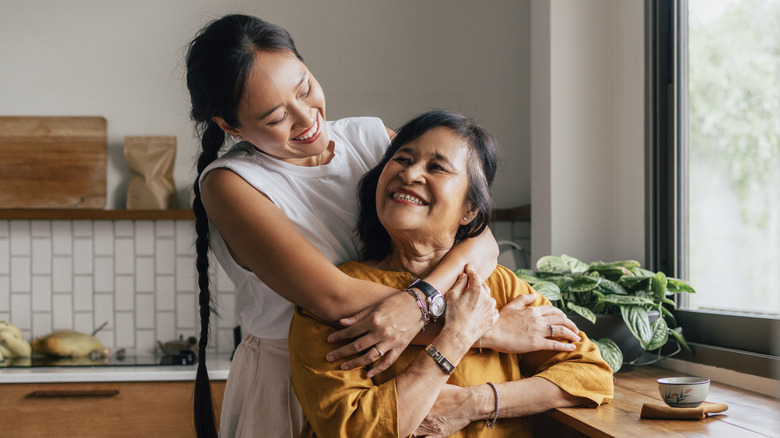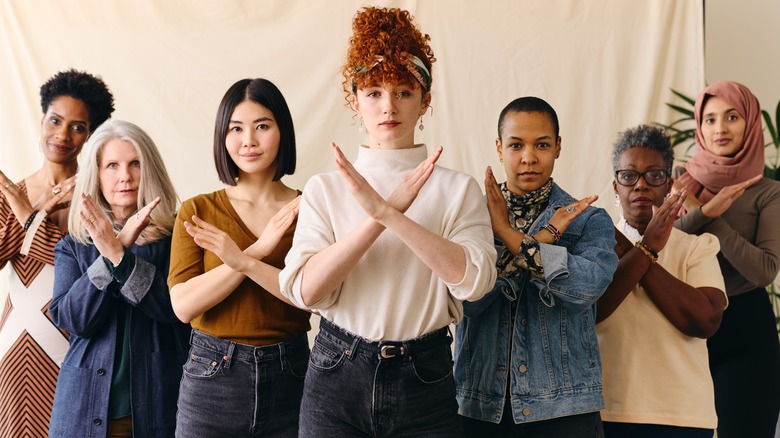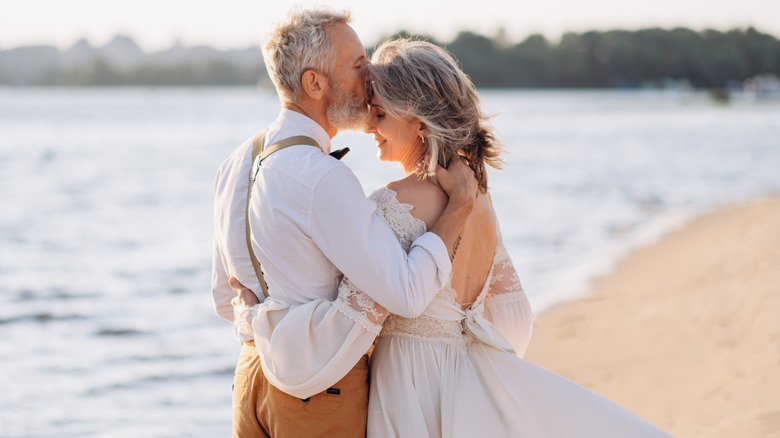11 Married Women Tell Us How They Hit Back At Criticism For Keeping Their Last Names
Changing your name after marriage is a tradition that is historically rooted in patriarchy and stems from the property exchange between a woman's father or brother and her future husband. This tradition has long affected a woman's identity — her original surname was often an indicator of her family background, lineage, and cultural heritage. But after it changed, her identity became watered down and was subsumed by those of her husband. While some argue that changing one's name after marriage is a personal choice, it's essential to recognize the patriarchal underpinnings of this tradition and the ways in which it reinforces gender norms and power dynamics in relationships. "Is this just a harmless tradition, or is there some sort of meaning leaking from those times to now," asks Simon Duncan, a professor at the University of Bradford in the U.K. (via BBC).
Despite present-day society being more gender-inclusive in comparison to years before, the statistics about name-changes in modern society are eyebrow-raising. Per The New York Times, according to one of the biggest surveys on matrimonial name change in recent years, only about 20% of women in the U.S. have kept their own names.
However, there are some contemporary women who have rejected this tradition and found alternative ways to express their commitment to their spouse without erasing their own identity. For the women that have broken this patriarchal tradition, here's how they hit back at criticism over keeping their last names.
'I like my name'
Our names are an integral part of our identity and sense of self, and it's often the first word we learn to recognize and respond to as infants. When we like our own name, it can give us a feeling of pride and confidence in who we are.
However, we don't get to choose our names at birth and reserve the right to change them if we want. People may choose to forgo their given names for different reasons such as their association with estranged family members or because they simply just don't like their name. But if we do like our names, it can be inspiring to show pride in our appellation.
Ashley felt pride for her name and also loved how it looked when she wrote it. "I have a great signature and didn't want to have to figure out a new one," she told Women.com. Many women also keep their names when they achieve academic success because it gives them credit for their achievements as opposed to their spouses — but also because they like how their accolades sound next to the name they grew up with. "I earned my doctorate the year before my wedding and I quite liked the sound of 'Dr. Bowers,'" Jennifer told us.
Not every culture has the tradition of taking a spouse's name after marriage
In Western culture, we see the tradition of the name change after marriage portrayed in mainstream society and, therefore, assume it's the same way in every country — but it's not. Taking a spouse's last name after marriage is a tradition that is not universal and varies widely across cultures.
In Greece, for example, a woman is legally obliged to keep her maiden name, following a law that was passed in 1983 forbidding women from taking their spouse's name after marriage. "For women, it was an emancipation to keep our own names after marriage," said Maria Karamessini, the director of the Center for Gender Studies at Panteion University in Athens (via The Guardian). "Our feminist movement changed mentalities, but it was gradual."
Furthermore, in Spain, Iceland, and Korea, the cultural practice is for women to keep their original names. "I am Korean and in Korean culture, women usually keep their maiden name," Christina told us.
Women can also be responsible for carrying on a family name
Society puts a lot of pressure on people to carry on their family names to future generations, and this pressure is usually aimed at sons. There is a strong emphasis on male heirs and their lineage meaning that the men often dictate the familial narrative.
In many cases, this has led to discrimination against girls and women and a preference for male children. This hope for male heirs is often linked to patriarchal values, where men are seen as having a role in continuing the family line. But this begs the question: Is the male lineage considered more important in society than the woman's lineage? "Some men still insisted on it — the reproduction of that sort of patriarchal assumption from the past," says Professor Simon Duncan from the University of Bradford on the percentage of men that wanted to preserve their last names (via the BBC). "Some women go along with that or internalize that."
Traditionally, a family's legacy is passed down through male descendants, while the women of the family often sit on the sub-bench. However, it's time we recognize that women can also be responsible for immortalizing their familial moniker by passing their own last names onto their children. "Being the only child to my parents, they feared that their name would not be carried on through a son, so it gave me great joy to be able to do that for them," Crystal shared with us.
Names can be tied to ethnic identity
Names can be an important aspect of ethnic identity, as they often reflect a person's cultural and linguistic background. Names can also serve as a connection to one's ancestral homeland or heritage. For individuals from marginalized communities, such as immigrants or refugees, their name may be one of the few things they have that connects them to their cultural roots, and changing or anglicizing their name can feel like a loss of their identity. For instance, due to English colonization, the use of the Irish language declined in Ireland during the 17th century but the language itself still remains an integral part of Irish identity — especially names. Marriages, therefore, can include a blend of cultures and nationalities, and many women feel like giving up their maiden names means forsaking their ethnic identity.
Christina, who is Korean, felt she would be abandoning her culture if she took her husband's name. "I married a Taiwanese man and changing my last name meant that I would subtly be changing my ethnic identity," she said. Saara also shared this concern with us. "My last name is very distinctively Finnish and my culture and background mean a lot to me," she said.
Overall, names can be an essential part of a person's ethnic, historical, or personal identity. "I was truly reclaiming my own identity after the divorce from my first husband, and had no intention of subsuming my identity again with my second (and final!) husband," Lucia Women.com.
It's a double standard — we don't see many men changing their names
When it comes to heterosexual couples in mainstream Western society, it's common practice for women to take their husband's name after marriage. However, we don't see this practice reversed too often. The notion is almost even too taboo to suggest! "Rarely do I encounter a woman who would ask a man to change his name," Heather told us. "If we are equal, why would they expect me?" This tradition is rooted in men being assumed the dominant figures in relationships. This gender imbalance in naming practices perpetuates gender roles and reinforces traditional power dynamics within relationships. Are his name and lineage more important than yours?
In 2022, The Washington Post interviewed several professionals in the wedding industry, and none of them came upon a groom taking his bride's name. "I've not seen one groom take a bride's last name," said Andrew Zill, who has worked in events for two decades. "I've never had a man take the woman's last name," stated Heidi Hiller, CEO of a party planning company.
According to The Knot's 2021 Real Weddings Study, 78% of couples chose one name to represent their union, but the genders were concealed. However, some marriages are proof that it happens. "In addition to keeping my last name, my husband decided to take it as well! He had no ties to his last name and was happy to become a part of the Kirkpatrick clan," Crystal said.
The history of changing your last name after marriage is too deeply rooted in misogyny
Up until the 19th century, Anglo-American legal systems practiced coverture — a legal doctrine that existed in many societies throughout history. Under coverture, a married woman's legal identity and rights were amalgamated with her husband's. This meant that a woman could not own property, make contracts, sue, or be sued in court without her husband's consent. Coverture was a reflection of patriarchal values that viewed women as inferior to men and in need of male protection and guidance. It effectively stripped women of their autonomy and agency and made them legally dependent on their husbands. While coverture is no longer a formal legal doctrine, its legacy is still evident in societal attitudes and practices that perpetuate gender inequality and discrimination.
Historically, taking a husband's name signified the property transfer of a woman, and many modern women don't want to preserve this practice in the present day. "After knowing the history of the tradition, I did not want to perpetuate that value system," Marcia told Women.com.
It's crucial to question traditions when advocating for gender equality. Practices from hundreds and even thousands of years ago that stem from patriarchal canon have diluted their way into mainstream society yet we often just treat them as tradition. Rather than going along with tradition because it's the norm, it can be empowering to challenge it.
It's an 'odd' tradition
"Tradition" seems like a fancy term for problematic practices in history that have become normalized in modern society. Taking your spouse's name after marriage may be one of them if your reasons for the name change are based on custom alone. "My husband was totally fine with [me keeping my name] and thought it was an odd tradition. He understood — he wouldn't want to change his name," Marcia said.
With no legal requirements for a woman to take her spouse's name, the reason is often purely based on tradition and the expectation usually falls on women to do the changing. Even when we examine the notion of hyphenating a last name in heterosexual relationships, statistics show that the woman is usually the only person in the marriage who will hyphenate her name while the husband keeps his own surname intact. According to a 2018 study published in "Socius: Sociological Research for a Dynamic World," only 3% of the 13% of heterosexual couples that participated in the survey hyphenated their names with their wives so that both shared the same last name (via Sage Journals).
Gender equality advocates would argue that it's a sign of inequality for a woman to take her husband's name after marriage, especially if it's an assumption or expectation that she will and he won't.
Being nontraditional is more liberating than following what society dictates
Knocking the foundations that patriarchy stands on can be empowering. For many women, keeping their own names after marriage is their part to play in smashing the patriarchy. Jaclyn has always been nontraditional. She had a baby and bought a house before she got married, despite her family pressuring her to tie the knot. So, keeping her own name was an autonomous move for her. "I'm just not all that traditional," she told us. "I didn't want a hyphenated last name. My daughters have two middle names, the second of which is [my last name]." Jaclyn certainly shows us that there are creative ways of incorporating different surnames within families.
Certain groups in society, such as white, cisgender, heterosexual, able-bodied, and wealthy individuals, have historically dominated public perception and the media landscape. However, society is a lot more diverse than what is always presented to us. The media is often responsible for showcasing nuclear families with a single surname, but there's so much that constitutes a family than the typical nuclear dynamic that dominates mainstream representation. Single parents, step-parents, foster parents, adopted parents, and parents in multi-partner unions may have different names from the children in the family. LGBTQ+ families may also consist of parents with different last names. Therefore, having multiple names in one family not only breaks tradition, but it's also the standard in many families.
Women are not property
It goes without saying. By the mid-19th century, women in the U.S. were seen as more autonomous in the eyes of the law — especially since the Married Women's Property Act in 1839. And while many marriages today consider each spouse as an equal, changing your name to your spouse's out of tradition may perpetuate unconscious biases that the woman in the marriage comes second. "I remember the first week we got married my husband came back from work and said that somebody had said to him 'You let your wife keep her name?'" Tracy shared with us. "He laughed and said 'Well first of all, 'let' didn't really have anything to do with it, and secondly, why would I want to try to brand her with my name?'"
The statement that women are not property may seem obvious, but historically, women were viewed as possessions of men, with little to no legal or social rights of their own. This belief was also reflected in cultural practices, such as arranged marriages, dowries, and forced marriages, which treated women as objects to be exchanged rather than individuals with agency. Women's rights movements have worked to challenge these beliefs and practices and have fought for equal rights and protection for women. Subsequently, the act of keeping one's own name in the present day can be seen as a nod to the work that women's liberation movements did for our right to self-govern.
The paperwork to change your name is too much of a hassle
It's a fair point. Changing one's last name after marriage can be a complicated and time-consuming process. There are legal obligations to changing your name and a myriad of organizations to inform which costs time and money and can affect those with financial and economic barriers. There's also the task of presenting yourself to the world with a new identity which can be a big endeavor too. "All the paperwork and hassle of getting new passports, credit cards, etc., just wasn't worth the time or effort," Ashley shared with us.
For many women, changing your name back to your maiden moniker after a divorce is also a major headache, as Heather revealed. "In my first marriage, I hyphenated, and the paperwork involved to change it back was a ridiculous administrative task, to say the least — credit cards, frequent flier programs, government IDs, tax documents, etc." Many women also told us that their businesses, brands, and websites were in their name so changing it would mean being inconsistent with their professional identity.
The people in the marriage are the only ones who make the rules in the marriage
The people in a marriage are the only ones who have the right to make decisions about their own relationship, as they are the ones who understand their unique needs, goals, and preferences. While family, friends, and society may offer opinions or advice, it's ultimately up to the individuals in the marriage to decide what rules work best for them.
When asked about her response to criticism over keeping her own last name, M'Bilia told Women.com: "I politely insinuate that it's none of their business and I also tell them that my partner and I will make the decisions that are within the best interests of our marriage and our family." What works for one couple may not work for another, and there is no "right" or "wrong" way to structure a marriage.
Having the same name does not equate to a happy marriage
Having the same last name as one's spouse does not necessarily equate to a happy marriage, as a healthy and fulfilling marriage is based on much more than just shared surnames. While some couples may choose to change their names after marriage as a sign of commitment or tradition, it's important to recognize that names do not define the marriage or the individuals within it.
A healthy marriage relies on trust, communication, compassion, and respect. If your spouse respects you, they should also respect your name and what it represents for you. If two people in a marriage have retained their own names, that says healthy marriage for so many reasons. "Names are not a substantive factor in determining a happy marriage so I don't care," Jennifer said.
Having different surnames in a family also doesn't diminish the unity of the family as a whole. Whether members of a family share a last name or not, they are still connected by their shared history and relationships.
Keeping your last name means sharing your identity with your spouse
Marriage is a union of two individuals and their families, and it's important to recognize and respect each other's differences while also working to build a shared life together. This can involve making compromises and adjustments to surnames. Embracing your new spouse's background and heritage when you get married can be an enriching experience, as it allows you to learn about and share their cultural or ethnic traditions, customs, and beliefs that often come with a name. This may involve learning a new language, participating in cultural events or traditions, or simply being open to different ways of thinking and being.
However, rather than abandon your family heritage, cultural differences, or even language, you can embrace one another's individuality, shares reader Heather with Women.com. "I did something more meaningful than changing my identity; I kept it and shared it with the person I love," they said.
A name might be just a word at the end of the day, as Shakespeare put it, "What's in a name? That which we call a rose by any other name would smell as sweet." But for some people, a name represents identity, liberation, and a whole lot of paperwork!













